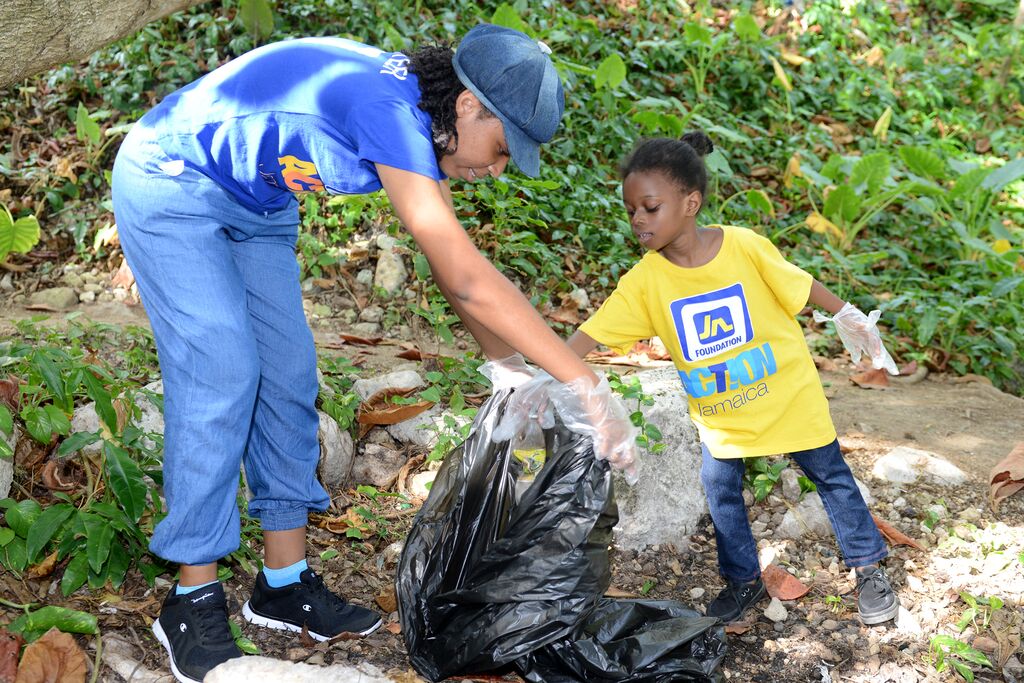The Jamaica National Group displays a refreshing affinity for partnering with like-minded charitable institutions in its drive to do public good.
It empowers those it commits to uplift by providing them with modern day’s most potent and transformative tools: education, financial literacy and job skills.
Hundreds of young Jamaicans who want to join the labour market are now better prepared to face potential employers because of experiences being passed on to them at learning centres that the building society-led group has established in working class communities across the island.
These facilities are an important step in a sustained effort to improve national student performance at multiple levels of the educational system. The millions of dollars in scholarships and bursaries that the organisation awards each year also serve as a virtual lifeline for students and young adults who are striving for a brighter future.
The charitable arm of this financial group – The JN Foundation – was registered in 1990, just about the time when the institution began its transition to the multifaceted conglomerate it is today. The foundation was created to serve as the vehicle by which the group would channel the corporate social responsibility outreach that was being undertaken by individual subsidiaries and through its branch network.
Chaired by Earl Jarrett, the head of its parent company, the JN Foundation has four full-time members of staff with the day-to-day operation overseen by a general manager, Saffrey Brown. Its work is supported by the subsidiaries within the wider JN Group, each setting aside between 3.5 per cent and 5 per cent of its annual statutory profit as its contribution.
Jamaica National has an ambitious and bullish national agenda and counts among its many goals the creation of a well-trained and robust workforce that can help the country achieve its long-term economic vision.
It has in place a programme that is shepherding non-governmental organisations (NGOs) towards weaning themselves from their chronic dependence on charitable donations. Thousands of Jamaicans depend on these institutions for survival.
All of this activity has not come cheap. Last year, JN spent $159 million on its many causes, and during the five-year period 2011 to 2015 the tab added up to nearly $700 million, about a quarter of which was provided by international agencies with which the foundation collaborated to bring many of its projects to fruition.
“The ultimate aim of the foundation is to build a skilled, educated and healthy workforce to support the sustainable growth and development of Jamaica,” declare the managers in responding to queries made by the Business Leader Award programme about their charity. The goal, according to them, will be achieved “through consultations with stakeholders and with extensive research into the national development priorities”.
The JN Foundation has carved out a unique virtual space within the world of charity for its unerring promotion of personal safety, particularly targeted at protecting the country’s young and its most vulnerable. This undertaking is supported by the Federation Internationale de l’Automobile, a global entity dedicated to road safety.
One programme that has cemented the foundation’s reputation as a prodigious nurturer of entrepreneurism is the Social Enterprise Boost Initiative (SEBI). In 2012, the project was seeded with a US$1-million grant from the United States Agency for International Development, with JN as the managing partner and executer.
Brown told the Business Leader Award programme that SEBI was developed to help NGOs reduce their dependence on donation by transforming them into viable social enterprises. JN relies on a combination of in-house expertise and hired consultants to serve as mentors to these entities. The mentors expose them to best business practices and help them establish procedures and structures that give them a fighting chance at achieving sustainable profitability and growth.
From Brown’s perspective, this approach has been a win-win for all. Not only do many of the NGOs eventually make the transition to profitable businesses, along the way they are able to help some of the very individuals who were once recipients of their charity into making their own transformation to productive contributors to the enterprise.
“We started to look at not-for-profit to become sustainable,” Brown explains. “They can transition into the social enterprise model. The young people get trained and receive jobs within the businesses, and we use them as part of the social intervention.”
The Mustard Seed Community in St Andrew is one example of an NGO that is making this journey. Its egg production operation, along with its tilapia fish farm, have been reshaped along the lines of real businesses and both are now operating at higher efficiency levels and with greater output and profitability.
The same is true of the Multicare Foundation in Kingston, and Portmore Self-Help Mobility and Resource Centre. These are among the 60 NGOs that are at various stages in their metamorphosis towards becoming self-financing social and economic enterprises, thanks to the work being done by the JN Foundation.
Among the early, quantifiable success of this programme:
They have generated more than $38 million in revenue and have provided employment for 130 individuals from the communities where they are located – though the human impact is much broader, with 720 community members being uplifted in one form or the other.
Together, these businesses have launched 15 brand new products and six of the groups have gone on to put in place new programmes that are designed to protect and preserve the environment.
Jamaica National says that these organisations received some $28 million in direct funding and estimates that they have benefited from an additional $66 million in the form of in-kind support.
Yet, in assessing the impact of this programme, Brown argues that an important factor that is to be taken into consideration is that these entities now have a sustainable template for success that they can use as they continue to take advantage of new business opportunities that emerge within their markets.
The JN Foundation is also making its presence felt in selected working class neighbourhoods with another of its corporate social outreach projects.
In 2007, it took to the inner-city community of August Town in St Andrew, its latest initiative to uplift the underserved residents. It constructed a facility – which it branded The Source Centre – equipping it with wireless Internet cafe, audio-visual room for training and meetings, community business office, photocopy machines and so on. Residents now had access to these services without having to leave their neighbourhood.
Others followed in Maverley, St Andrew; Treasure Beach, St Elizabeth; Ocho Rios, St Ann; and Savanna-la-Mar, Westmoreland.
Each of the five centres has a core service which allows it to earn revenue for self-sustainability, while each community typically adds services to meet its peculiar needs. For example, the August Town location has an employment readiness programme where a consultant helps residents of the community prepare for job interviews.
“These are basic skills that we take for granted but which many of them have never been exposed to,” says Brown.
Another case in point where a service has been tailor-made to meet the unique needs of a community is the centre in Savanna-la-Mar. Here, many local residents with young children were once unable to participate in training sessions but now have a dedicated place at the centre to keep them while they attend to their own educational and training needs.
JN says that this particular centre – that it developed in collaboration with the Y’s Mennetes Service Club – “has quickly become the go-to spot for many important community activities. Events such as skills training seminars, exhibitions and wedding receptions are regularly held at the state-of-the-art resource facility”.
There are other ways in which the JN Foundation is impacting the lives of Jamaicans. It is a regular provider of financial support for a project in Spanish Town called BWise that provides a second chance to kids who have to fend for themselves doing odd jobs on the streets. Here, they find training and mentorship aimed at creating a pathway for them to become productive adults.
Then, there is the iLEAD school transformation project – an initiative that seeks to help low-performing schools lift their standards.
“The project supports and empowers school leaders in 10 low-performing schools in St Thomas, Portland and St Mary to make significant changes in their schools that will produce improved academic and social outcomes for students, their families and communities,” JN explains.
The foundation has also been a big promoter of volunteerism – within its workforce and among is broad membership base. Take the case of its member advisory councils. These are made up of customers of the building society who are selected to form a seven-member committee at each branch. This committee in turn is drafted into the world of philanthropy by providing the branch with advice on what charity to fund in the community that it serves.
“These are people with accounts with JN,” explains Brown. “They are involved in the way we give back to communities. They are closer to the action and have a better sense of the needs that are to be met. People feel really engaged and they know the areas of needs.”
But JN’s more direct pitch to those it is striving to draw into the culture of volunteerism came in 2011 with the launch of the ACT!ON Jamaica Volunteer programme.
Here is how the foundation explains the raison d’etre of this initiative: “Act!on Jamaica was developed as a mechanism to facilitate staff volunteerism in programmes that contribute in a real way to national development. In 2013, the programme was extended to the wider JN family – our partners and other development agencies – so that they could participate in the foundation’s and partners’ activities. The programme offers structured and meaningful volunteering opportunities islandwide for Jamaicans passionate about making a difference in their communities.”
The social enterprise forum that the foundation organised in 2015 at the Jamaica Pegasus Hotel in Kingston was an attempt to deepen that engagement. The event brought together social enterprises from all over the island to showcase their work to each other and the general public.
“People thought they were on their own,” says Brown. “We were showcasing the work of social enterprise and to get the public to understand what it is, to get people to understand that they can move from subsisting to a growth entity and become part of a growth economy.”
For their part, JN staff members are encouraged to get involved in projects, and according to the foundation, many do.
“JN Group employees are actively involved in programmes and projects at every level,” declares the organisation. It cites as examples staff participating “in ad hoc volunteer projects, to leading service clubs, serving on non-profit boards, and driving policy through planning committees at the Planning Institute of Jamaica, as well as setting up organisations to drive social change”.
All told, some 8,130 high school and tertiary level students are impacted each year by a combination of scholarships and bursaries and the iLead programme organised by this foundation. Approximately 64,000 primary school students have been trained in road safety techniques and 19,280 people have been trained in financial literacy through the BeWise programme.
“We take great pride in creating high-impact projects that inspire Jamaicans to be creative and innovative, so that they can reach their fullest potential and help uplift family and community and ultimately create positive and sustainable growth in Jamaica,” says JN.
It continues: “Annually, a wide cross section of organisations, companies and persons are impacted by the JN Foundation. On an annual basis, JN Foundation programmes reach many hundreds of thousands of Jamaicans and directly impact approximately 98,000.”
– Moses Jackson is the founder of the Jamaica Observer Business Leader Award programme and the chairman of the award selection committee. He may be reached at
moseshbsjackson@yahoo.com




